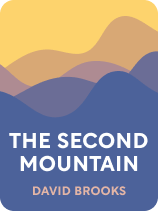

This article is an excerpt from the Shortform book guide to "The Second Mountain" by David Brooks. Shortform has the world's best summaries and analyses of books you should be reading.
Like this article? Sign up for a free trial here.
What’s a daemon? How can it help you find your vocation in life?
Unlike careers, vocations are central to your identity. That’s why it’s important to find yours. In The Second Mountain, David Brooks says that you first need to identify your obsession in life.
Read on for Brooks’s advice on how to find your vocation in life.
How to Find Your Vocation
Vocations are different from careers. Brooks argues that vocations are found in response to an injustice that demands your attention. Because they involve righting a wrong, vocations often involve serving those less fortunate than yourself. Consequently, they rarely deliver the prestige that careers do.
If vocations provide the fulfillment that Brooks suggests, then it’s crucial to find yours. Brooks offers his advice on how to find your vocation, claiming that you have to find a cause that you care about so deeply that it provides a constant source of energy. According to Brooks, this obsession will point you toward your vocation.
First, however, Brooks considers an alternative process—the so-called rational approach—that involves weighing costs and benefits to decide which vocation to adopt. For instance, you might assess the good that you could achieve via different vocations—such as working in local politics, running a food bank, or becoming an environmental activist—then select the vocation likely to achieve the most good.
Though the rational approach is intuitive, Brooks argues that it can’t help you find your vocation. After all, this approach only works if you can grasp your decision’s consequences ahead of time. But, because vocations transform you as a person, you can only grasp the consequences of choosing a vocation after the fact. For instance, no amount of research into social workers will reveal what it’s like to be a social worker—that’s something you must experience first-hand.
| Cost-Benefit Analyses and the Effective Altruism Movement Although Brooks decries the rational approach to finding a vocation, the effective altruism movement takes precisely that approach. Broadly speaking, effective altruism aims to help others in the most cost-effective manner possible. With respect to careers, then, effective altruists argue that you should choose the career that maximizes expected value to the world—even if that means simply choosing a high-paying career and donating all your excess money. In defense of effective altruism, prominent thinkers like Peter Singer—a founder of the movement—have argued that it’s a simple-yet-effective way to lead an ethical life centered around helping others. Other philosophers, however, have argued that effective altruism’s focus on concrete, short-term aid makes it impossible to address broader institutional problems, such as extreme poverty. Moreover, some have criticized the movement’s utilitarian foundation, claiming that its “earn-to-give” mentality neglects personal moral formation. So, it’s fair to say that effective altruism’s approach to career selection remains contentious. Still, it merits consideration alongside Brooks’s preferred approach. |
So, in lieu of a cost-benefit analysis, Brooks appeals to the Greek notion of a daemon. Put simply, a daemon is an enduring obsession that drives you. Your daemon, Brooks writes, reveals your deepest desire—the desire that provides lasting motivation. Consequently, your daemon guides you to your vocation. For example, if you’re obsessed with discovering the truth about public events, your vocation might be a journalist or a reporter.
Yet, Brooks observes that individualist culture numbs this obsession since it conflicts with your ego’s desires. For example, individualism’s overemphasis on the hallmarks of worldly success—like financial stability and prestige—can make us neglect the deeper desires of our daemon, as it’s often impossible to satisfy these deeper desires while pursuing worldly goals.
In turn, Brook provides several strategies for discovering your daemon. These include:
- Say yes to as many opportunities as possible—the more opportunities you embrace, the more likely you are to find something you’re passionate about.
- Surround yourself with people whom you admire—these people often kindle a burning desire to be like them.
- Reflect on the issues that burden your conscience—these issues can point you toward a daemon waiting to be found.
Brooks claims that, by embracing these strategies, you’ll be more likely to discover your obsession—and, in turn, your vocation.
| Further Strategies for Finding Your Vocation In Ikigai, Héctor García and Francesc Miralles aim to help you discover your ikigai, a Japanese term that roughly refers to your reason for being. Much like the daemon that Brooks discusses, your ikigai can point you toward your vocation. So, by embracing García and Miralles’s strategies for finding your ikigai, you can get closer to finding your vocation: Consider logotherapy, in which you work with a therapist who helps you discover your ikigai and overcome negative feelings like anxiety and meaninglessness. Consider Morita therapy, in which you first take a week of silence to clear out the daily stressors and anxiety that obscure your purpose. Learn to experience flow, the state of experience where you become so immersed that time flies by; moments of flow will point you toward your ikigai. |

———End of Preview———
Like what you just read? Read the rest of the world's best book summary and analysis of David Brooks's "The Second Mountain" at Shortform.
Here's what you'll find in our full The Second Mountain summary:
- The negative consequences of the West's focus on individualism
- Why you should embrace relationalism to lead a fulfilling life
- The four commitments that constitute relationalist living






